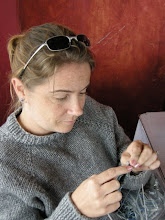BBC NEWS Africa Cattle raids 'kill 38' in Kenya This article talks about recent cattle raids in the north of Keny, which folks there attribute to the on-going drought and famine in the region. When I read articles like this or hear about these events at work, it really drives home the point for me that this world is not one, but many. I have been to northern Kenya and southern Sudan, and I have seen cattle herders and talked to them about conflict over grazing pastures and water holes, yet still I have trouble getting my Western mind around it. Cattle herders living in the Horn of Africa region are on the edge of survival every day, and they sing love songs to their cows because those cows mean life and hope to them.
I have heard people in the States call these cultures 'primitive', but they have been around a lot longer than our culture has, and yet they have not had the motive or opportunity to 'modernize'. They aren't more noble than we, as many would like to imagine. They aren't necessarily more spiritual or closer to nature. They, like all humans, make rational decisions, and act within what they perceive, given their cultural, geographic, political, and religious perspective, to be their best interests, just as we do.
The most interesting question to me is, "What are the conditions within which is it rational to kill other human beings over cattle?", which leads to the questions, "If it is decided that this is negative, how can the conditions under which is it no longer rational be brought about?" and "Who is in the appropriate position to decide whether a behavior is negative or positive?"
I know that I sound abnormally relativist here, and I can actually feel some of my friends and colleagues cringing as I write this even before they read it, but "development" and "justice" and "peace" depend largely on those questions. When we engage in "development", we implicitly decide, either with or for the targets of our development, that the status quo is inherently worse than the ideal to which we attempt to move them. Either we accept the value judgment of the target beneficiaries, which might be flawed by proximity to the issue, or we impose our own value judgment, which is flawed by distance from the issue.
Furthermore, much "development" work does not aim to create conditions under which rational action conforms to the ideal. Rather, much of it is aimed at treating the symptoms (getting people to dialogue instead of fight, rather than asking why there is conflict in the first place), or trying to encourage people to change their behavior without changing the conditions that made that behavior rational. This approach is absolutely not sustainable. If the conditions do not change, the rational response to them will also not change.
Therefore, if we decide that somehow we can figure out what the ideal world looks like and we commit to bringing that world into being, then we must change the fundamental cultural and social infrastructure of the world. This means activism against the status quo, which is dangerous and can have myriad negative outcomes as it is unpredictable and in conflict with the power structure.
Since I have yet to meet a development worker who is a committed activist for sea changes in culture and society (myself included), my conclusion is that we are lying to ourselves and others, feeding on a pleasant, ego-fulfilling fantasy that somehow we are making a difference. We might have a finger in the dyke, and it might be the right dyke. It might not be a dyke at all.
Thursday, January 19, 2006
Subscribe to:
Post Comments (Atom)


2 comments:
Last night we watched The Constant Gardener. Wow. It brings home the callousness of international “aid” programs.
What do we, the wealthy countries, hope to achieve with the work being done by governments and NGOs? I don’t believe that there is an expectation that we will arrive at permanent solutions to poverty in the LDCs. Permanent solutions would require greater commitment and sacrifice than governments and individuals are prepared to make. We will tax ourselves to undertake a misguided war to promote a “democratic” government in a country that will balkanize the moment we pull out, yet we would not put the same level of effort into programs to bring about systems to rationalize aid with culture in the developing world.
Since I work for an NGO, I can state surely that all the NGO workers I know really want to be part of making change happen and believe that they are doing so in at least a small way. I do not necessarily agree with them.
I agree with you that there is no serious expectation or intent among the powerful to eliminate poverty. As in the entry I wrote on Kenya, this is a rational choice. The question is why is it rational and for whom? I can't see that it is rational for big business. Keeping people poor and uneducated does them little good (although some radicals steadfastly believe otherwise, I point them to India, where education and the advent of a middle class allowed businesses to take greater advantage of that market).
Is it government? I expect so, but I can't really find a good reason for it, other than that elimination of poverty "over there" or even in this country is simply not politically expedient in a democracy with term limits and period elections. War is much more expedient (or appears to be so in a campaign).
Thus, regarding Iraq, it makes sense that our government took us to war. Conquering is much more public and obvious and quick than transforming. Who cares what happens afterward? No one will notice once Iraq is off the front pages, which it will be once the bombs stop dropping.
Post a Comment